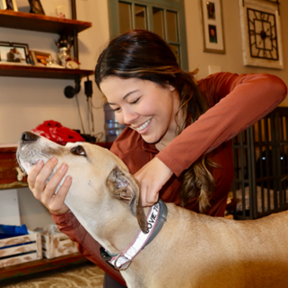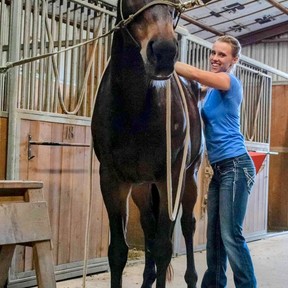nearest to you
-
Jessica Hollis
- ProAnimal Chiropractic - Licensed Animal Chiropractor - Montgomery, OH
-
 INSTANT
CHECKOUT
INSTANT
CHECKOUT
- Montgomery, OH - As an IVCA Certified Animal Chiropractor with over 210 hours of specialized training in animal chiropractic from Options for Animals, I am passionate about enhancing the health...
-
-
- Certified
- Book Now
-
Leslie Zook
- Certified Animal Chiropractor - Cincinnati, OH
-
 INSTANT
CHECKOUT
INSTANT
CHECKOUT
- Cincinnati, OH - Animal Chiropractic is a division of animal healthcare utilizing an all natural approach. Our main goal is providing measurable outcomes improving your animals quality of life. When...
-
-
- Licensed
- Certified
- Insured
- Book Now
- David Vargas
- Advanced Healing Center - Animal Chiropractic Care - Fort Wayne, IN
- Fort Wayne, IN - Does you furry friend have an issue that your vet hasn’t been able to help with and you want to avoid drugs and expensive surgery?? We...
-
-
- Licensed
- Certified
- Request Quote
-
Brent McConnell
- McConnell Animal Chiropractic Care - Greenville, PA
-
 INSTANT
CHECKOUT
INSTANT
CHECKOUT
- Greenville, PA - We offer specific, animal chiropractic care. Dr. McConnell is certified by the Animal Veterinary Chiropractic Board. This is the gold standard in Animal Chiropractic Certification. Please refer...
-
(1 review)
-
- Licensed
- Certified
- Insured
- Book Now
- Emily Barber
- Companion Chiropractic - Animal Chiro - Lafayette, IN
- Lafayette, IN - Dr. Emily, is a board certified and licensed human chiropractor with additional animal chiropractic training through Animal Chiropractic Education Source. She operates a mobile chiropractic clinic, parking...
-
-
- Licensed
- Request Quote
-
Dr. Rebecca Verna
- Paws for Holistic Pet Care - Animal Chiropractic Care - Marshall, VA
-
 INSTANT
CHECKOUT
INSTANT
CHECKOUT
- Marshall, VA - Our practice provides a Holistic Veterinary Medical Comprehensive Diagnostic and Treatment Plan, including: veterinary acupuncture, animal Chiropractic, Chinese massage, cold laser therapy, BEMER medical device therapy, nutrition...
-
-
- Book Now
-
Dr. Julie Adams
- Indian Creek Therapy - Animal Chiropractic Care - Davidson, NC
-
 PETWORKS
PICK
PETWORKS
PICK
 INSTANT
CHECKOUT
INSTANT
CHECKOUT
- Davidson, NC - Hello animal lovers! My name is Dr. Julie Adams. I am a licensed Chiropractor and certified animal Chiropractor. I have been caring for small and large animals...
-
(3 reviews)
-
- Licensed
- Certified
- Book Now
- Dr. Roger DeHaan
- Caring Holistic Vet Services and Animal Chiropractic Care - Kings Mountain, NC
- Kings Mountain, NC - Dr. DeHaan is a dedicated veterinarian with an impressive background rooted in agriculture and holistic health. Growing up on an organic vegetable farm and goat dairy,...
-
-
- Online Sessions
- Request Quote
- Bonnie Harder DC, VSMT
- Holistic Balance - Animal Chiropractic Care - Monroe Center, IL
- Monroe Center, IL - As a dedicated Licensed Chiropractor and Certified Veterinary Spinal Manipulation Therapist (CVSMT) with over 18 years of experience, I am passionate about enhancing the health and...
-
-
- Licensed
- Certified
- Online Sessions
- Request Quote
- Dr. Avery Garrabrant
- Dr. Avery Garrabrant - AVCA Certified Animal Chiropractor - Durham, NC
- Durham, NC - Dr. Garrabrant is an American Veterinary Chiropractic Association (AVCA) Certified Animal Chiropractor. She is NOT a veterinarian and her services do not replace traditional veterinary care. Dr....
-
-
- Licensed
- Certified
- Insured
- Request Quote
- Valentina Degiovanni
- Bella Vita Animal Chiropractic Care - Durham, NC
- Durham, NC - At Bella Vita Chiropractic, I am dedicated to providing comprehensive chiropractic care tailored to your beloved pets—whether they are furry companions or gentle giants. As a licensed...
-
-
- Licensed
- Certified
- Request Quote
-
Carolyn Longacre
- Evergreen Animal Chiropractic - Greenville, SC
-
 INSTANT
CHECKOUT
INSTANT
CHECKOUT
- Greenville, SC - Hello! I’m a licensed chiropractor with a Doctor of Chiropractic (DC) degree and am proud to be certified by the American Veterinary Chiropractic Association (AVCA). At Evergreen...
-
-
- Licensed
- Certified
- Insured
- Book Now
- Kelly Hill
- Full Circle Animal Wellness - Animal Chiropractic - Leland, MI
- Leland, MI - At Full Circle Animal Wellness, I’m committed to helping your beloved pets reclaim their vitality through a comprehensive suite of services, including chiropractic adjustments, massage therapy, cold...
-
-
- Licensed
- Certified
- Insured
- Request Quote
- Dr. Carlos Jimenez
- Veterinary Chiropractic and Animal Acupuncture - Coatesville, PA
- Coatesville, PA - Licensed veterinarian certified in veterinary chiropractic and acupuncture for dogs and horses, with over 30 years experience. Licensed in PA, NJ, MD, and FL. We are committed...
-
-
- Licensed
- Certified
- Online Sessions
- Request Quote
-
Kenneth Degroot
- DeGroot Chiropractic Center - Animal Chiropractic Care - Wilmington, DE
-
 INSTANT
CHECKOUT
INSTANT
CHECKOUT
- Wilmington, DE - Dr. Kenneth DeGroot has 39 years of practice experience He is Board Certified in the specialties of Chiropractic Orthopedics and Disability Analysis. With 18 years as the...
-
-
- Licensed
- Certified
- Insured
- Book Now
- Molly Mehlman
- Dr. Molly Mehlman - AVCA Certified Animal Chiropractor - De Pere, WI
- De Pere, WI - Dr. Molly is an AVCA certified animal chiropractor located in De Pere, WI. She sees dogs and cats out of her office in De Pere and...
-
-
- Licensed
- Certified
- Insured
- Request Quote
featured cities
- Cat Chiropractor Albuquerque
- Cat Chiropractor Atlanta
- Cat Chiropractor Austin
- Cat Chiropractor Baltimore
- Cat Chiropractor Boston
- Cat Chiropractor Charlotte
- Cat Chiropractor Chicago
- Cat Chiropractor Cleveland
- Cat Chiropractor Colorado Springs
- Cat Chiropractor Columbus
- Cat Chiropractor Dallas
- Cat Chiropractor Denver
- Cat Chiropractor Detroit
- Cat Chiropractor El Paso
- Cat Chiropractor Fort Worth
- Cat Chiropractor Fresno
- Cat Chiropractor Houston
- Cat Chiropractor Indianapolis
- Cat Chiropractor Jacksonville
- Cat Chiropractor Kansas City
- Cat Chiropractor Las Vegas
- Cat Chiropractor Los Angeles
- Cat Chiropractor Louisville
- Cat Chiropractor Memphis
- Cat Chiropractor Mesa
- Cat Chiropractor Miami
- Cat Chiropractor Milwaukee
- Cat Chiropractor Minneapolis
- Cat Chiropractor Nashville
- Cat Chiropractor New Orleans
- Cat Chiropractor New York City
- Cat Chiropractor Oklahoma City
- Cat Chiropractor Omaha
- Cat Chiropractor Philadelphia
- Cat Chiropractor Phoenix
- Cat Chiropractor Portland
- Cat Chiropractor Raleigh
- Cat Chiropractor Sacramento
- Cat Chiropractor San Antonio
- Cat Chiropractor San Diego
- Cat Chiropractor San Francisco
- Cat Chiropractor San Jose
- Cat Chiropractor Seattle
- Cat Chiropractor Tampa
- Cat Chiropractor Tucson
- Cat Chiropractor Tulsa
- Cat Chiropractor Virginia Beach
- Cat Chiropractor Washington DC
related articles
more info
When considering booking a session with a cat chiropractor, it's vital for pet parents to ask the right questions and fully understand the potential benefits and risks involved.
Is the chiropractor qualified and experienced in treating cats?
Why it’s important: Cats have unique anatomical and physiological needs, and not all chiropractors may be trained or experienced in feline care. Ensuring the chiropractor is qualified to treat cats is crucial for the safety and effectiveness of the treatment.
What to ask:
Are you certified by a recognized veterinary chiropractic organization for treating cats?
How many cats have you treated in your practice?
What specific training do you have in feline chiropractic care?
Answer to consider:
The chiropractor should be certified by a reputable organization like the American Veterinary Chiropractic Association (AVCA) or the International Veterinary Chiropractic Association (IVCA), with specific experience in feline care. They should have treated multiple cats and undergone specialized training that addresses the unique anatomy and behavioral characteristics of cats. This ensures they can safely perform adjustments and tailor the care to your cat’s specific needs.
What specific conditions can chiropractic care help with in cats and kittens?
Why it’s important: Understanding what chiropractic care can address helps pet parents determine if it’s the right treatment for their cat’s specific issues. Cats may have different health needs compared to dogs, so it's important to know if chiropractic care is appropriate.
What to ask:
What types of health issues in cats can benefit from chiropractic care?
Will chiropractic care help with my cat’s specific condition?
How will this treatment fit into my cat’s overall healthcare plan?
Answer to consider:
Chiropractic care for cats can help with a variety of issues such as spinal misalignments, arthritis, mobility problems, and even certain neurological conditions. It can also be used to improve overall well-being, particularly in older cats or those recovering from injury. The chiropractor should clearly explain how the treatment could benefit your cat’s specific condition and how it will complement other veterinary treatments your cat may be receiving.
What are the risks and aftercare involved in feline chiropractic care?
Why it’s important: Even with the best care, there are risks associated with chiropractic adjustments, and understanding these risks will help you make an informed decision and prepare for any necessary aftercare.
What to ask:
What are the potential risks of chiropractic care for cats and kittens?
What signs should I look for after the session to ensure my cat is responding well?
How should I care for my cat after a chiropractic session?
Answer to consider:
While chiropractic care is generally safe when performed by a qualified professional, potential risks include soreness, discomfort, or, in rare cases, injury. The chiropractor should explain these risks, as well as what to expect after a session, such as changes in your cat’s behavior or mobility. You should also receive clear instructions on aftercare, including how to monitor your cat for any adverse reactions and when to seek further veterinary advice.
These questions help ensure that you are fully informed about the process, benefits, and potential risks of feline chiropractic care, allowing you to make the best decision for your cat’s health and well-being.
To become a certified feline chiropractor, you typically need to complete a specialized training program focusing on veterinary chiropractic care. This involves obtaining a degree in veterinary medicine or chiropractic care, followed by a certification program that includes coursework, hands-on training, and examinations. The certification process ensures you gain expertise in diagnosing and treating musculoskeletal issues in cats. Continuing education and adherence to professional standards are also crucial for maintaining certification and staying updated with the latest techniques and research.
You may also consider booking these pet care services:
Cat Chiropractor by State





















